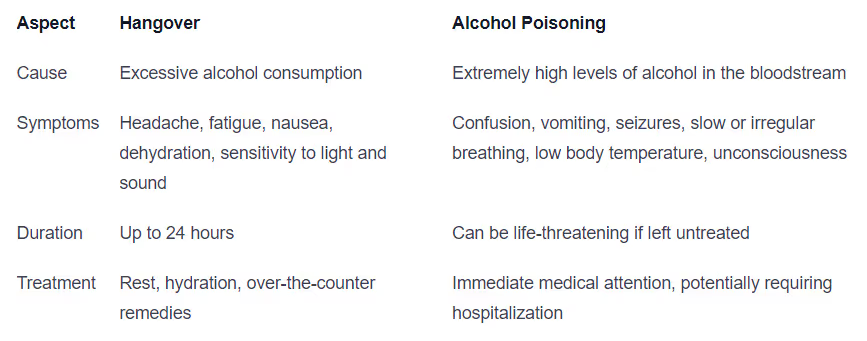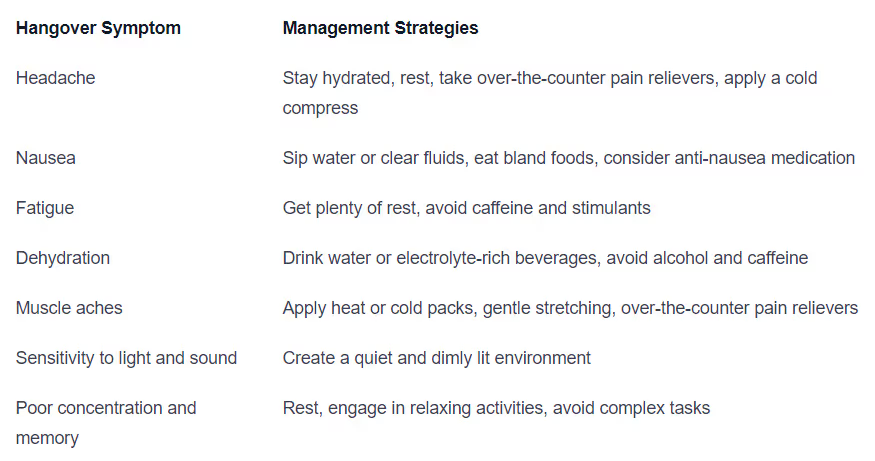What’s the Difference Between a Hangover & Alcohol Poisoning?

Hangover vs. Alcohol Poisoning: Understanding the Difference
When it comes to the aftermath of excessive alcohol consumption, it's important to differentiate between a hangover and alcohol poisoning. While both can occur after a night of heavy drinking, they represent different levels of alcohol-related effects on the body.
What is a Hangover?
A hangover is the unpleasant set of symptoms that can occur after consuming alcohol. It is the body's response to the toxic byproducts produced when alcohol is metabolized. Hangover symptoms typically emerge within a few hours of alcohol consumption and can last up to 24 hours.
Hangover symptoms can vary from person to person, but common signs include headache, fatigue, nausea, sensitivity to light and sound, dehydration, and difficulty concentrating. These symptoms are generally manageable and gradually improve as the body metabolizes the alcohol and recovers.
What is Alcohol Poisoning?
Alcohol poisoning, on the other hand, is a severe and potentially life-threatening condition that requires immediate medical attention. It occurs when there is an excessive amount of alcohol in the bloodstream, overwhelming the body's ability to metabolize it effectively.
Alcohol poisoning can result from consuming large quantities of alcohol in a short period of time. The symptoms of alcohol poisoning are more severe compared to a hangover and may include confusion, vomiting, seizures, slow or irregular breathing, low body temperature, and unconsciousness. If left untreated, alcohol poisoning can lead to coma or even death.
To better understand the difference between a hangover and alcohol poisoning, refer to the following table:

It's important to remember that alcohol poisoning is a medical emergency, and anyone suspected of having alcohol poisoning should seek immediate medical help. Understanding the difference between a hangover and alcohol poisoning can help individuals make informed decisions about their alcohol consumption and know when to seek appropriate medical assistance.
Signs and Symptoms
To differentiate between a hangover and alcohol poisoning, it's important to be aware of the signs and symptoms associated with each condition. Understanding these differences can help you determine the appropriate course of action and seek the necessary medical attention when needed.
Hangover Symptoms
A hangover is characterized by a range of physical and mental symptoms that occur after consuming alcohol. The severity and duration of these symptoms can vary from person to person, depending on factors such as the amount of alcohol consumed and individual tolerance levels. Some common hangover symptoms include:
- Headache
- Fatigue and weakness
- Nausea or upset stomach
- Sensitivity to light and sound
- Muscle aches and pains
- Dizziness or lightheadedness
- Thirst and dehydration
- Difficulty concentrating
- Mood disturbances, such as irritability or anxiety
While hangover symptoms can be uncomfortable and unpleasant, they generally improve over time as the body processes and eliminates the alcohol from the system. Adequate rest, hydration, and over-the-counter remedies can help alleviate these symptoms.
Alcohol Poisoning Symptoms
Alcohol poisoning, on the other hand, is a potentially life-threatening condition that requires immediate medical attention. It occurs when a person consumes a large amount of alcohol in a short period, overwhelming the body's ability to metabolize and process it. Some common signs and symptoms of alcohol poisoning include:
- Confusion and disorientation
- Vomiting or retching
- Seizures
- Slow or irregular breathing (less than eight breaths per minute)
- Blue-tinged or pale skin
- Low body temperature (hypothermia)
- Unconsciousness or inability to wake up
- In severe cases, alcohol poisoning can lead to respiratory failure, coma, or even death.
If someone exhibits these symptoms after consuming alcohol, it is crucial to call emergency services immediately. Alcohol poisoning is a medical emergency, and prompt medical intervention is necessary to ensure the person's safety and well-being.
Differentiating between a hangover and alcohol poisoning is essential to determine the appropriate level of care. While a hangover can be managed with self-care measures, alcohol poisoning requires immediate medical attention. It's important to be vigilant and aware of these signs and symptoms to ensure the health and safety of yourself and others.
Causes and Risk Factors
Understanding the causes and risk factors associated with hangovers and alcohol poisoning can help differentiate between the two conditions. While both are related to alcohol consumption, they differ in their severity and underlying causes.
Causes of Hangovers
Hangovers are primarily caused by the consumption of alcoholic beverages. When alcohol is broken down in the body, it produces a toxic substance called acetaldehyde. This compound contributes to the symptoms commonly associated with a hangover, such as headache, nausea, and fatigue.
Several factors can influence the severity of a hangover, including:
- Alcohol Volume: The amount of alcohol consumed plays a significant role in the intensity of a hangover. Consuming excessive amounts of alcohol can lead to more severe symptoms.
- Dehydration: Alcohol is a diuretic, meaning it increases urine production and can cause dehydration. Dehydration can contribute to symptoms like dry mouth, thirst, and dizziness.
- Congeners: Congeners are substances produced during the fermentation and aging process of alcoholic beverages. Darker liquors, such as red wine, brandy, and whiskey, contain higher levels of congeners, which can intensify hangover symptoms.
- Individual Differences: Each person's body metabolizes alcohol differently, leading to variations in susceptibility to hangovers. Factors such as genetics, overall health, and tolerance levels can influence the severity of hangover symptoms.
Causes of Alcohol Poisoning
Alcohol poisoning is a potentially life-threatening condition that occurs when high levels of alcohol overwhelm the body's ability to metabolize it. It is typically the result of consuming large amounts of alcohol within a short period. The body's vital functions, such as breathing, heart rate, and body temperature, can be severely affected by alcohol poisoning.
The primary cause of alcohol poisoning is acute alcohol intoxication, which arises from:
- Binge Drinking: Consuming a large quantity of alcohol in a short time, often defined as consuming more than four to five drinks for women and five or more drinks for men within a two-hour period.
- High Alcohol Concentration: Consuming beverages with high alcohol content, such as spirits or strong cocktails, can increase the risk of alcohol poisoning.
- Inexperienced Drinkers: Individuals who are not accustomed to drinking or have a low tolerance to alcohol are more susceptible to alcohol poisoning.
- Mixing Alcohol with Other Substances: Combining alcohol with drugs or medications can enhance the effects of alcohol and increase the risk of alcohol poisoning.
It's crucial to be aware of the causes and risk factors associated with both hangovers and alcohol poisoning. By understanding these distinctions, individuals can make informed decisions regarding alcohol consumption and seek appropriate help when necessary.
Effects on the Body
Understanding the effects of a hangover and alcohol poisoning is essential for differentiating between these two conditions. While both are consequences of excessive alcohol consumption, they have distinct effects on the body.
Effects of a Hangover
A hangover is the body's response to the consumption of alcohol and typically occurs after the intoxicating effects of alcohol wear off. The exact mechanisms behind hangovers are not fully understood, but they are believed to be a result of various factors, including dehydration, inflammation, and the toxic byproducts of alcohol metabolism.
The effects of a hangover can vary from person to person, but common symptoms include:
- Headache
- Fatigue and weakness
- Nausea and vomiting
- Sensitivity to light and sound
- Dizziness
- Muscle aches and pains
- Dry mouth and excessive thirst
- Poor concentration and memory
- Mood disturbances, such as irritability or depression
These effects are typically temporary and subside within 24 to 48 hours as the body recovers. Adequate rest, rehydration, and consuming nutritious foods can help alleviate the symptoms of a hangover.
Effects of Alcohol Poisoning
Alcohol poisoning, on the other hand, is a serious and potentially life-threatening condition that requires immediate medical attention. It occurs when a person consumes a dangerously high amount of alcohol in a short period.
Alcohol poisoning can have severe effects on the body, including:
- Confusion and disorientation
- Vomiting, sometimes uncontrollable
- Seizures
- Slow or irregular breathing
- Low body temperature (hypothermia)
- Bluish skin or pale complexion
- Unconsciousness or coma
- Irregular heartbeat or cardiac arrest
Unlike a hangover, the effects of alcohol poisoning are not self-limiting and can rapidly worsen. If left untreated, alcohol poisoning can lead to severe brain damage, organ failure, and even death.
It's important to note that alcohol poisoning is a medical emergency. If you suspect someone may be experiencing alcohol poisoning, it is crucial to seek immediate medical help.
Understanding the effects of a hangover and alcohol poisoning can help individuals make informed decisions about their alcohol consumption. It's essential to drink responsibly and be aware of the signs and symptoms of alcohol-related conditions to ensure the well-being and safety of oneself and others.
Treatment and Prevention
When it comes to dealing with the aftermath of excessive alcohol consumption, understanding how to manage a hangover and how to address alcohol poisoning is crucial. Let's explore the treatment and prevention strategies for both.
Managing a Hangover
A hangover is typically the result of consuming too much alcohol and can leave you feeling physically and mentally drained. While there is no magical cure for a hangover, there are steps you can take to alleviate the symptoms and help your body recover.

Prevention is key when it comes to hangovers. To minimize the likelihood of experiencing a hangover, it's important to drink alcohol in moderation, pace yourself, and stay hydrated by drinking water between alcoholic beverages. Eating a substantial meal before drinking can also help slow down alcohol absorption and reduce the severity of a hangover.
Dealing with Alcohol Poisoning
Unlike a hangover, alcohol poisoning is a serious medical emergency that requires immediate attention. If you suspect someone may be experiencing alcohol poisoning, it's crucial to seek medical help right away by calling emergency services.

While waiting for medical help to arrive, there are a few things you can do to support the person experiencing alcohol poisoning. Ensure that they remain on their side to prevent choking on vomit, keep them awake and alert, and monitor their breathing and pulse.
Prevention of alcohol poisoning starts with responsible drinking. Know your limits and avoid excessive alcohol consumption. It's important to look out for one another and intervene if someone shows signs of severe intoxication. If you suspect someone may have alcohol poisoning, do not hesitate to seek medical assistance immediately.
Understanding the treatment and prevention strategies for both hangovers and alcohol poisoning can help you make informed decisions about alcohol consumption and prioritize your well-being. Remember, moderation is key, and knowing the difference between a hangover and alcohol poisoning can help ensure your safety and that of those around you.
When to Seek Medical Help
Understanding when to seek medical help is crucial when dealing with the aftermath of alcohol consumption. Knowing the difference between a hangover and alcohol poisoning can help you make informed decisions about seeking medical assistance. Here's a breakdown of when to seek help for each condition.
When to Seek Help for a Hangover
In most cases, a hangover can be managed at home with self-care remedies. However, there are situations where medical attention may be necessary. It's important to seek help for a hangover if:
- Severe dehydration occurs: If you're experiencing severe dehydration symptoms such as dizziness, rapid heartbeat, or extreme thirst that doesn't improve with oral rehydration, it's essential to seek medical help. Intravenous fluids may be required to replenish your body's hydration levels effectively.
- Persistent vomiting: While vomiting can be a common symptom of a hangover, persistent and uncontrollable vomiting can lead to dehydration and electrolyte imbalances. If you're unable to keep fluids down or if vomiting persists for an extended period, medical attention should be sought.
- Severe headache or migraines: Headaches are a common hangover symptom, but if you experience an unusually severe headache or migraine that is unresponsive to over-the-counter pain relievers, it may be necessary to consult a healthcare professional for appropriate treatment options.
- Chest pain or difficulty breathing: If you're experiencing chest pain or difficulty breathing, it's important to seek immediate medical attention, as these symptoms could indicate a more serious underlying condition.
- Signs of alcohol poisoning: If you suspect that your symptoms may be more severe than a typical hangover and align with the signs of alcohol poisoning (as discussed in the previous section), it is crucial to seek medical help promptly.
When to Seek Help for Alcohol Poisoning
Alcohol poisoning is a serious medical emergency that requires immediate attention. If you suspect someone may be experiencing alcohol poisoning, don't hesitate to seek medical help. It's crucial to call emergency services or take the person to the nearest emergency room if any of the following symptoms are present:
Symptoms
Mental confusion or stupor
Unconsciousness
Slow or irregular breathing
Vomiting while unconscious
Seizures
Hypothermia (low body temperature)
Pale or bluish skin
Slow heart rate
Inability to wake up
Remember, alcohol poisoning can be life-threatening, and time is of the essence when it comes to seeking medical help. It's important not to wait for symptoms to worsen before taking action. The sooner medical professionals can intervene, the better the chances of a positive outcome.
Understanding the appropriate circumstances for seeking medical help can help ensure your safety and the well-being of others. If you're unsure about the severity of your symptoms or suspect alcohol poisoning, it's always better to err on the side of caution and seek immediate medical attention.
Conclusion
Alcohol consumption is a common social activity and can be enjoyed in moderation. However, it's essential to understand the potential consequences of excessive alcohol consumption, including hangovers and alcohol poisoning. By being aware of the signs and symptoms of these conditions, individuals can make informed decisions about their alcohol consumption and take necessary precautions to ensure their safety and well-being.
While there is no cure for a hangover, self-care remedies such as adequate rest, hydration, and nutrition can help alleviate its symptoms. On the other hand, alcohol poisoning is a severe medical emergency that requires immediate attention. If you suspect someone may be experiencing alcohol poisoning or are unsure about the severity of your symptoms, do not hesitate to seek medical help.
Remember to drink responsibly and prioritize your health and safety above all else. By understanding the effects of excessive alcohol consumption and knowing when to seek medical assistance, you can enjoy alcohol in moderation without putting yourself or others at risk.
Sources:
- https://www.geisinger.org/health-and-wellness/wellness-articles/2017/03/22/15/00/beware-of-these-signs-of-alcohol-poisoning#:~:text=You%20can%20reduce%20the%20effects,coffee%20or%20other%20home%20remedies.
- https://purerecoveryca.com/whats-the-difference-between-a-hangover-alcohol-poisoning/
- https://coastaldetox.com/resources/alcohol-poisoning-or-hangover/
